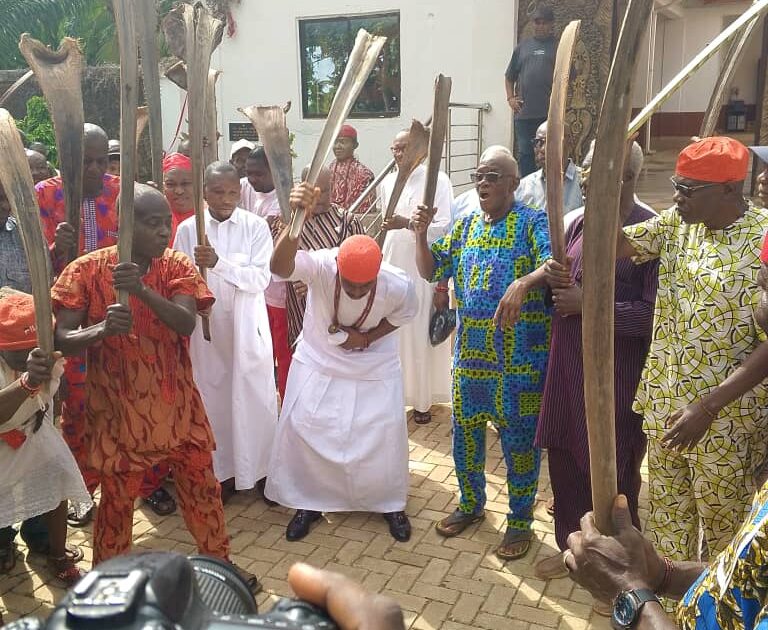The tranquility of Issele-Uku, a community nestled within Aniocha North Local Government Area of Delta State, Nigeria, has been shattered by a surge in criminal activities, particularly kidnappings and killings, during the first quarter of 2025. This alarming escalation of insecurity has instilled fear among residents, transforming their once peaceful haven into a hotbed of anxiety. In response to this unprecedented crisis, the community has turned to traditional spiritual measures, invoking ancestral practices to combat the escalating criminal menace.
Following a series of deliberations involving the traditional ruler, HRM Obi Nduka, chiefs, the spiritual head (Eze-Dibie), and titled elders, the Issele-Uku kingdom resolved to conduct the “Ine Ubi” ceremony, a spiritual cleansing ritual involving curses directed at the perpetrators of these heinous acts. This ancient tradition, passed down through generations, serves as a last resort to restore peace and harmony to the land when conventional methods prove insufficient. The decision to invoke this potent spiritual intervention underscores the gravity of the situation and the community’s unwavering determination to reclaim their security.
The traditional ruler, HRM Obi Nduka, publicly addressed the community, expressing profound concern over the deteriorating security situation. He emphasized the community’s historically welcoming and hospitable nature, starkly contrasting with the current climate of fear and apprehension. This departure from their traditional ethos necessitates a robust response, leading to the adoption of the “Ine Ubi” ceremony. While acknowledging the efforts of government and security agencies, the monarch stressed the urgency of the situation and the need for intensified action. He reiterated the fundamental constitutional duty of the government to ensure the security and welfare of its citizens, urging them to bolster their efforts in addressing this critical issue.
The “Ine Ubi” ceremony, a pivotal element of the community’s response, involved a solemn procession through the nine villages of Issele-Uku. Residents carried symbolic objects – palm sticks, Bibles, and chaplets – representing the community’s unified stand against the escalating criminality. These items underscore the blend of traditional beliefs and religious convictions within the community, emphasizing a collective appeal for divine intervention. The procession culminated at the palace, where collective curses were invoked upon kidnappers, armed robbers, charm planters, and all those contributing to the unrest within the kingdom. This public display of spiritual resistance serves as a powerful deterrent, demonstrating the community’s resolve to combat the forces threatening their peaceful coexistence.
The decision to invoke spiritual curses highlights the severity of the security situation and the depth of the community’s desperation. While working in tandem with government and security agencies, the community feels compelled to explore all avenues, including traditional practices, to protect its members and restore peace. The “Ine Ubi” ceremony transcends a mere ritual; it represents a communal plea for divine intervention and justice, demonstrating their commitment to reclaiming their security and tranquility. This act serves as a testament to the strength of their cultural heritage and their unwavering belief in the power of collective action, both spiritual and physical.
The Issele-Uku community’s response to the security crisis showcases a multifaceted approach. They acknowledge the role of government and security forces while simultaneously drawing upon their rich cultural heritage to address the immediate threat. This blend of traditional practices and collaboration with external authorities demonstrates a comprehensive strategy aimed at eradicating the root causes of insecurity and restoring lasting peace to their community. The “Ine Ubi” ceremony, while a spiritual act, also carries a powerful symbolic message of resilience, unity, and the unwavering resolve of the Issele-Uku people to protect their homeland and preserve their way of life.














